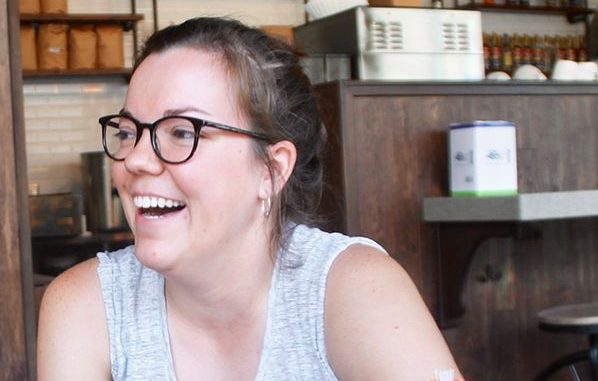
The first thing Molly Scullion says to the audience at the start of her show is “please laugh.”
In her one-woman comedy show, “I’m OK, Are You OK?”, Scullion, a 2017 media studies and production and classics alumna, tells the story of her journey of healing and coping with long-repressed trauma from a childhood sexual assault, which resurfaced right before Scullion came to Temple at 18 years old. The five-day run of the show at the Adrienne Theater for the Fringe Festival ended on Sunday.
“I think when people read the description of the show they get a little nervous and a little scared of it,” she said. “It’s a thing people are afraid to laugh at…but I feel so confident that the show is good for people who have or have not experienced trauma.”
The show’s focus on trauma “makes it sound like it’s a really sad show,” Scullion said, but she thinks it’s actually very funny.
“Even when it was such a dark period, there was so much silly stuff that happened that, looking back on it now, is a lot of fun to bring forth in a show,” she said.
Scullion decided to write the show’s script the day after the 2016 presidential election.
“I saw the state of the nation and I was afraid, so I thought, ‘You know what, it’s time to do something that I’m scared of, that’s just for me,’” Scullion said. “I didn’t want to wait anymore.”
She spent three months working on the concept and a month working “nonstop” on the draft. After two shows in February and two in March, her performances last week delivered a “more refined” version of the show, she said.
Scullion has studied improvisation since she was 16, when she researched comedians she loved and found they all got their start in improv. She began watching different improv routines on YouTube before enrolling in classes at Philly Improv Theater, or PHIT Comedy.
“I got more and more involved, and began writing more in college and loved that too,” she said. “After that first improv class at 16, I just kept diving in more and more and more.”
Scullion warned her mother and close family members in advance of the show’s subject matter, but everyone else she knew had no idea of the show’s content.
“Everyone from the community who came didn’t know this about me,” she said. “Some of my friends who came had no idea. The weirdest part is walking out after the show and into the lobby and seeing everyone there and being like, ‘OK, yeah, it’s me!’”
Carolyn Beatty, lead house manager at PHIT Comedy and a close friend of Scullion, said she is the same person both on and off the stage.
“In the show, you get a strong sense of what a warm, funny and strong person she is, and that’s exactly how she is in real life,” Beatty said. “The only thing is she is even more of a goofball in real life than in the show.”
Scullion believes her performance conveyed that she is “happy with how things turned out” in the aftermath of her recovery.
“It’s so nice to have this thing out in the open,” she added. “But I also like that people feel like they can talk to me about it now.”
Writing and producing “I’m OK, Are You OK?” helped her process her past and remember her inner strength, she said.
“It’s such a weird thing diving into this dark part of my life, but once I finally figured out the structure of the show, that was really helpful in me continuing to heal,” she said. “I’d go back to those darker places and realize, ‘Hey, I’m OK that it happened now.’”
For Scullion, the hardest part of performing the show is retelling the moment when she told her mother about her past trauma, because she is often in the audience. Scullion showed her mother the script’s draft; she said her mother’s reaction was “both sad and proud.”
“I think it’s so comforting for her to know that I’m doing a show about it, and that I’m OK,” Scullion said.
MaryAnn Thackrah, one of Scullion’s friends from high school and a senior psychology major, attended a performance of “I’m OK, Are You OK?” last March when Scullion performed at PHIT Comedy. She had seen Scullion’s comedy performances before, and she said the show was a “surprising” departure from her usual work.
“I’m definitely happy I went,” she said. “It’s such a different performance than I’m used to seeing, especially since it was in a comedy club. But I loved how open and comfortable she was about talking about it.”
Scullion said she hoped that people would feel comfortable laughing at the content of her show.
“There were people who came up to me who had experienced similar things in childhood,” she said. “I remember a woman coming up to me and saying, ‘This was the first time I could laugh at this. Thank you for that.’”
“That was like, ‘OK, I think I did something good here,” she added. “And that was awesome.”



Be the first to comment